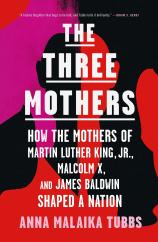The Three Mothers: How the Mothers of Martin Luther King, Jr., Malcolm X, and James Baldwin Shaped a Nation
Review
The Three Mothers: How the Mothers of Martin Luther King, Jr., Malcolm X, and James Baldwin Shaped a Nation
Berdis Baldwin, Louise Little and Alberta King. The percentage of Americans who might recognize these names is approximately zero. But their lives, struggles and accomplishments are every bit as important as those of the people we generally acknowledge as American heroes. And that is why Anna Malaika Tubbs’ detailed account of their lives is so significant and timely. Her study, THE THREE MOTHERS, shines a brilliant light on the influence that these three women exerted in the lives of their sons: James Baldwin, Malcolm X and Martin Luther King Jr.
Tubbs powerfully demonstrates that the importance of these mothers has been grossly overlooked and undervalued for the same reasons that the plights of Black Americans, women in general and Black women in particular, have been buried --- or denied. A history of oppression, humiliation and degradation of people of color has plagued this country since its inception.
All three women suffered the same indignities as their Black male contemporaries, though their individual stories vary in terms of environment and ancestry. But the crux of each of their stories is both depressingly and inspiringly similar. Each of them married men whose personal flaws placed the brunt of the raising and education of their children on the women themselves.
Of the three, Alberta King had the happiest and most productive childhood. Her parents were admired and widely respected clergy people. They were instrumental in the growth of the influential Ebenezer Baptist Church in Atlanta, Georgia, and Alberta was given and proudly accepted the responsibility and mission to maintain the church’s heritage and traditions. She was brilliant and musically gifted, and was an exceptionally capable teacher and organizer. When she met her husband, Michael King, he was very much a product of his rural background --- shy, relatively uneducated and naive. But they fell in love, and Alberta encouraged and prodded him to continue his formal education and develop the self-discipline and willpower that eventually would result in his leadership role at Ebenezer Baptist.
"We must profusely thank Anna Malaika Tubbs for bringing these heretofore untold stories of amazing women to our attention. It should have happened long ago.... She has brought to light the heroism of people whose lives have rarely been studied and presented to the public."
But it was Alberta who took and held the reins in raising and educating their children, instilling the ideas and ideals of the Christianity that was the foundation of their overarching moral values and their insistence on carrying on the struggle for equality. Their son, Michael Jr., inherited those qualities as well as those talents from his mother. The young man was also brilliant and poetic, and he, too, was a powerful influence on those around him. When his grandfather, Martin King, died, Michael Sr. decided that in his father’s honor, he would change his name and his son’s name to Martin. Thus was “born” Martin Luther King Jr. Like the other two mothers who are the subjects of this book, Alberta outlived her son, though ironically she was assassinated in 1974 by a crazed individual --- while she played the organ at a church service. But her brilliance, character and influence should never again be overlooked.
Berdis Baldwin’s young womanhood was startlingly different from Alberta’s. She had spent her early years living in poverty on Deal Island in Maryland. Her father was a seaman, and she spent many hours on the water with him as he worked. Eventually, the unusually creative young woman felt constrained by the limited opportunities on the island, and she made her way to Philadelphia and then New York, searching for the variety and excitement of a different kind of life. It was the 1920s, the era of the Harlem Renaissance. She loved it. Harlem’s vitality matched her own, and she was taken by the intellectual spirit of the place and the time. Unfortunately but inevitably, she was lonely and poverty-stricken. When she met a man to whom she was attracted, she had an affair with him, and the result was the birth of her first child, James.
Later, Berdis married a man named David Baldwin and had eight more children. But James always remained her pride and joy. David, however, hated and abused James. He was an absurdly rigid Pentecostal preacher, an angry, frustrated man who simply could not abide the realities of the cruel white supremacy that haunted him. He sank ever more deeply into severe depression and ultimately became a totally broken man, mentally and emotionally. But Berdis persisted and survived. Against all odds, she miraculously maintained her openness, warmth, kindness and devotion to her children. She opened James’ path to literary greatness and fame, and remained his rock and his comfort until the day he died. She was his muse and his inspiration, the primary reason for his phenomenal success as an essayist, poet, novelist, playwright and civil rights activist.
Louise Little’s story is perhaps the most jarring and inspiring of the three biographies. Fighting the inevitable handicaps of bigotry and poverty, she, like Berdis, remained steadfastly true to her principles. She and her husband, Earl, were enthusiastic supporters of Marcus Garvey, a well-known but controversial fighter for equality and recognition of the evils of white supremacy. He was neither subtle nor gentle, and Louise and Earl were openly and loudly supportive of Garvey’s radical opinions and actions. Earl died after their children were born, and it’s likely that he was murdered by white men who hated his entirely uninhibited condemnations of white people. He was crushed under the wheels of a streetcar. But Louise carried on. She taught her children everything she believed about their rights to real freedom and equality, and she recognized that those rights could not be won unless they were willing to fight to attain them.
After her husband’s death, Louise single-handedly fought off a KKK threat to attack her home and her family. Then, because she stubbornly insisted on raising her children by herself, all the while proclaiming the injustices of the white power structure, they were taken from her, and she was institutionalized. They said she was crazy. Incredibly, she was held against her will in that alleged home/hospital for 25 years, but she doggedly maintained her sanity and her fighting spirit until her children, who never gave up fighting for her release, were successful in bringing her back home. Meanwhile, her most “trouble-making” son had changed his religion to Islam and his name to Malcolm X, and he was assassinated shortly after Louise’s homecoming. But before he died, he had advanced the cause that his mother had lived for --- perhaps as effectively and certainly as valiantly as any American hero. Louise lived for 26 more years, fighting all the way.
We must profusely thank Anna Malaika Tubbs for bringing these heretofore untold stories of amazing women to our attention. It should have happened long ago. I would be remiss, though, if I did not point out some flaws in the narrative that detract a bit from the power of the author’s efforts. I lay the blame for these shortcomings squarely at the feet of her editors. The basic organizational structure of the work is questionable. Chapters jump almost randomly, it seems, from general contextual background information to sections specifically about the women’s lives and then back again. There are also many instances of awkward sentence structures and ineffective word choices. And finally, the timelines are often confusing and occasionally incorrect. In one instance, for example, we read about the awful pictures of Black people that appeared in magazines, in other periodicals and books, and on television --- in the 1920s and ’30s --- before television was commercially available to the general public.
However, we should not allow these flaws to interfere with or detract from our appreciation of Tubbs’ work. She has brought to light the heroism of people whose lives have rarely been studied and presented to the public. Her book should be read and carefully considered and absorbed by every American who cares about equality, justice and the inalienable rights of Black women, Black mothers and all people of color.
Reviewed by Jack Kramer on March 5, 2021
The Three Mothers: How the Mothers of Martin Luther King, Jr., Malcolm X, and James Baldwin Shaped a Nation
- Publication Date: December 28, 2021
- Genres: Biography, History, Nonfiction
- Paperback: 288 pages
- Publisher: Flatiron Books
- ISBN-10: 1250756138
- ISBN-13: 9781250756138




